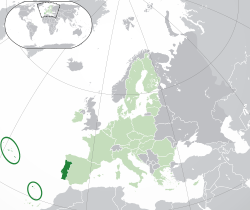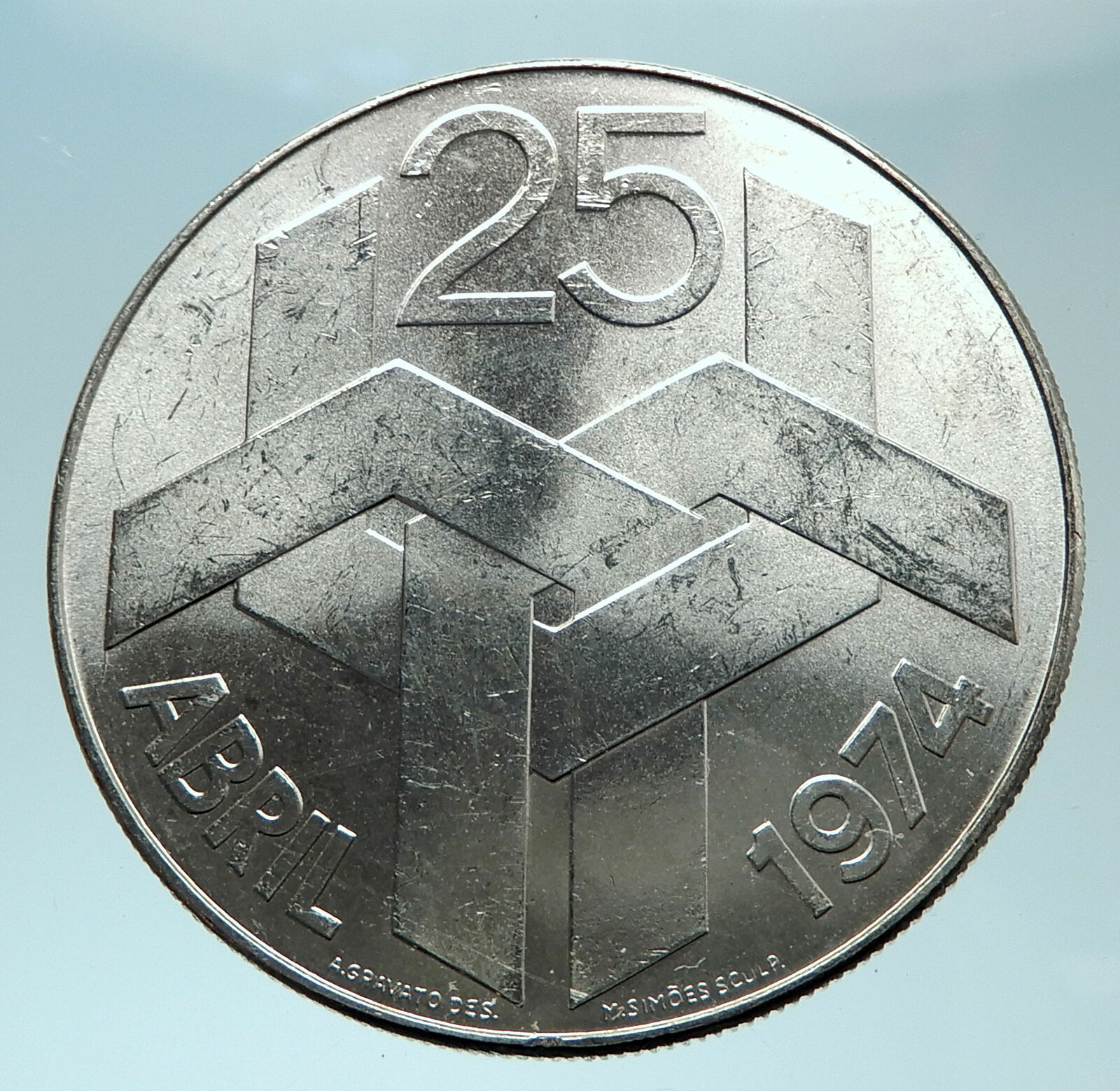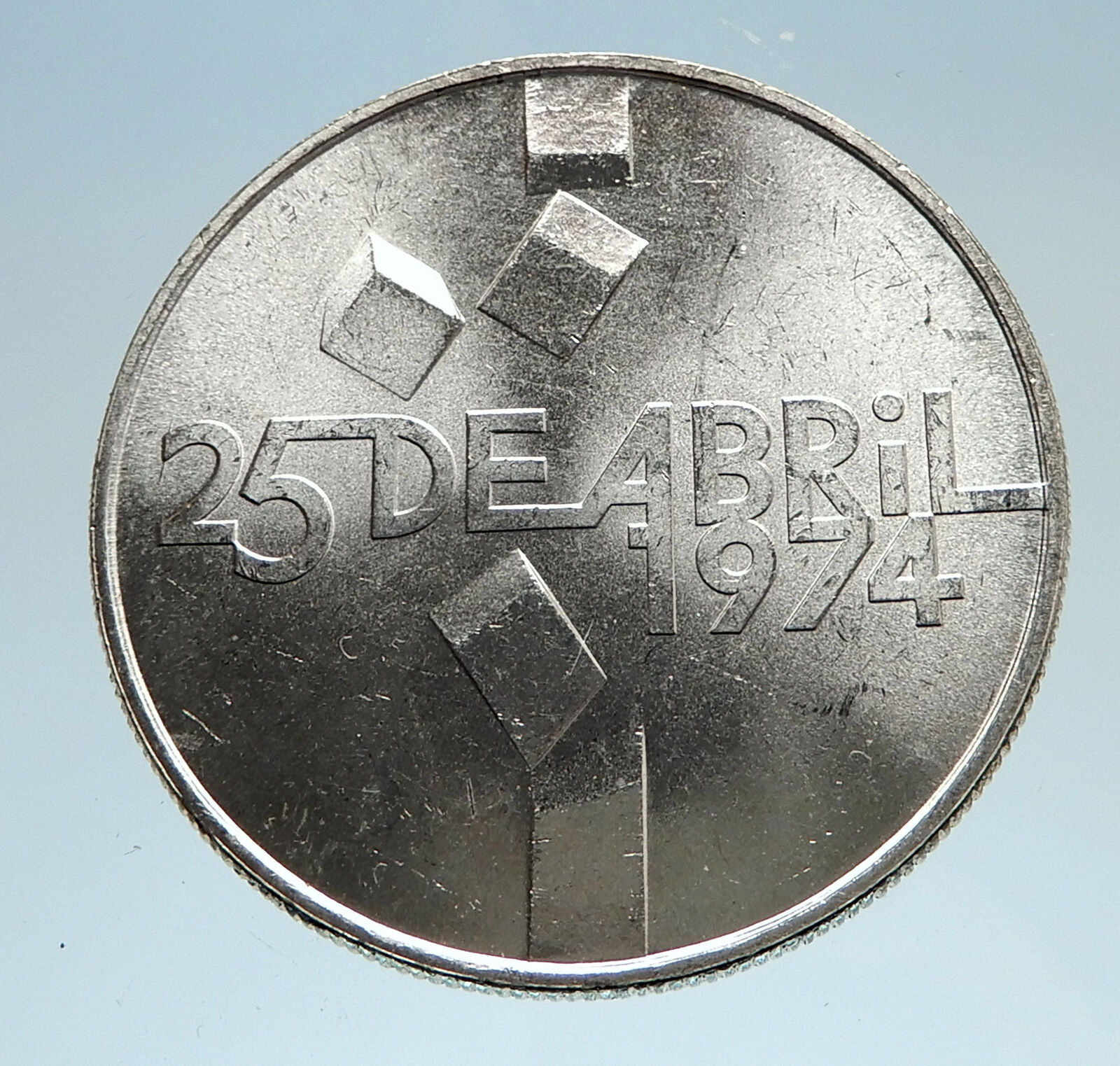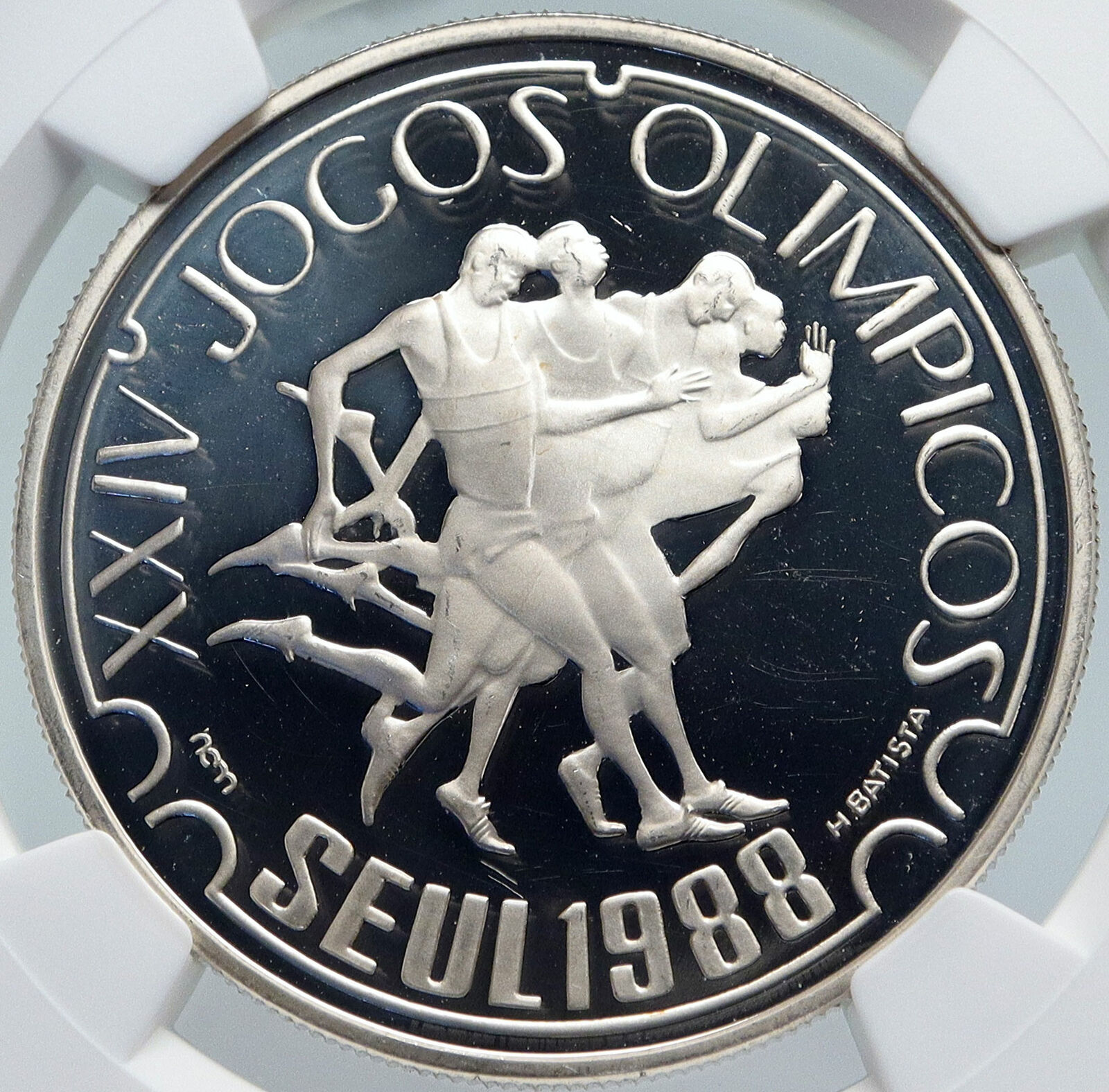|
Portugal – Olympic Games 2004 in Athens
2004 Silver 10 Euro
40mm (27.14 grams) 0.500 Silver (0.4312 oz. ASW)
Reference: KM# 759 | Engraver: J. Aurélio
REPÚBLICA 10 EURO PORTUGUESA, Waves flow down from shield within circle avove.
JOGOS OLIMPICOS ATENAS 2004 INCM AURELIO, Olympic logo left, flag right, intricate inscription above.
You are bidding on the exact item pictured, provided with a Certificate of Authenticity and Lifetime Guarantee of Authenticity.
 The 2004 Summer Olympics (Greek: Θερινοί Ολυμπιακοί Αγώνες 2004, Therinoí Olympiakoí Agónes 2004), officially known as the Games of the XXVIII Olympiad and commonly known as Athens 2004 (Greek: ΑθΗΝΑ 2004, Athena 2004), were an international multi-sport event held from 13 to 29 August 2004 in Athens, Greece. The Games saw 10,625 athletes compete, some 600 more than expected, accompanied by 5,501 team officials from 201 countries. There were 301 medal events in 28 different sports. Athens 2004 marked the first time since the 1996 Summer Olympics that all countries with a National Olympic Committee were in attendance, and also saw the return of the Olympic Games to the city where they began. Having previously hosted the first modern Olympics in 1896, Athens became one of only four cities to have hosted the Summer Olympic Games on two separate occasions at the time (together with Paris, London and Los Angeles). The 2004 Summer Olympics (Greek: Θερινοί Ολυμπιακοί Αγώνες 2004, Therinoí Olympiakoí Agónes 2004), officially known as the Games of the XXVIII Olympiad and commonly known as Athens 2004 (Greek: ΑθΗΝΑ 2004, Athena 2004), were an international multi-sport event held from 13 to 29 August 2004 in Athens, Greece. The Games saw 10,625 athletes compete, some 600 more than expected, accompanied by 5,501 team officials from 201 countries. There were 301 medal events in 28 different sports. Athens 2004 marked the first time since the 1996 Summer Olympics that all countries with a National Olympic Committee were in attendance, and also saw the return of the Olympic Games to the city where they began. Having previously hosted the first modern Olympics in 1896, Athens became one of only four cities to have hosted the Summer Olympic Games on two separate occasions at the time (together with Paris, London and Los Angeles).
A new medal obverse was introduced at these Games, replacing the design by Giuseppe Cassioli that had been used since 1928. This rectified the long lasting mistake of using a depiction of the Roman Colosseum rather than a Greek venue; the new design features the Panathenaic Stadium.
The 2004 Olympic Games were hailed as “unforgettable dream games” by IOC President Jacques Rogge, and left Athens with a significantly improved infrastructure, including a new airport, ring road, and subway system. However, there have been arguments (mostly in popular media) regarding the cost of the 2004 Summer Games and their possible contribution to the 2010-18 Greek government-debt crisis, but there is little or no evidence for such a correlation. The 2004 Games were generally deemed to be a success, with the rising standard of competition amongst nations across the world. The final medal tally was led by the United States, followed by China and Russia with Greece at 15th place. Several world and Olympic records were broken during these Games.
  Portugal, officially the Portuguese Republic (Portuguese: República Portuguesa), is a country on the Iberian Peninsula, in Southwestern Europe. It is the westernmost country of mainland Europe, being bordered by the Atlantic Ocean to the west and south and by Spain to the north and east. The Portugal-Spain border is 1,214 km (754 mi) long and considered the longest uninterrupted border within the European Union. The republic also includes the Atlantic archipelagos of the Azores and Madeira, both autonomous regions with their own regional governments. Portugal, officially the Portuguese Republic (Portuguese: República Portuguesa), is a country on the Iberian Peninsula, in Southwestern Europe. It is the westernmost country of mainland Europe, being bordered by the Atlantic Ocean to the west and south and by Spain to the north and east. The Portugal-Spain border is 1,214 km (754 mi) long and considered the longest uninterrupted border within the European Union. The republic also includes the Atlantic archipelagos of the Azores and Madeira, both autonomous regions with their own regional governments.
 The territory of modern Portugal has been continuously settled, invaded and fought over since prehistoric times. The Pre-Celts, Celts, Phoenicians, Carthaginians and the Romans were followed by the invasions of the Visigothic and the Suebi Germanic peoples, who were themselves later invaded by the Moors. These Muslim peoples were eventually expelled during the Christian Reconquista. Portuguese nationality can be traced back to the creation of the First County of Portugal, in 868. In 1139, Afonso Henriques was proclaimed King of Portugal, thus firmly establishing Portuguese independence, under the Portuguese House of Burgundy. The territory of modern Portugal has been continuously settled, invaded and fought over since prehistoric times. The Pre-Celts, Celts, Phoenicians, Carthaginians and the Romans were followed by the invasions of the Visigothic and the Suebi Germanic peoples, who were themselves later invaded by the Moors. These Muslim peoples were eventually expelled during the Christian Reconquista. Portuguese nationality can be traced back to the creation of the First County of Portugal, in 868. In 1139, Afonso Henriques was proclaimed King of Portugal, thus firmly establishing Portuguese independence, under the Portuguese House of Burgundy.
In the 15th and 16th centuries, under the House of Aviz, which took power following the 1383-85 Crisis, Portugal expanded Western influence and established the first global empire, becoming one of the world’s major economic, political and military powers. During this time, Portuguese explorers pioneered maritime exploration in the Age of Discovery, notably under royal patronage of Prince Henry the Navigator and King João II, with such notable discoveries as Vasco da Gama’s sea route to India (1497-98), Pedro Álvares Cabral’s discovery of Brazil (1500), and Bartolomeu Dias’s reaching of the Cape of Good Hope. Portugal monopolized the spice trade during this time, under royal command of the Casa da Índia, and the Portuguese Empire expanded with military campaigns led in Asia, notably under Afonso de Albuquerque, who was known as the “Caesar of the East”.
The destruction of Lisbon in a 1755 earthquake, the country’s occupation during the Napoleonic Wars, the independence of Brazil (1822), and the Liberal Wars (1828-1834), all left Portugal crippled from war and diminished in its world power. After the 1910 revolution deposed the monarchy, the democratic but unstable Portuguese First Republic was established, later being superseded by the “Estado Novo” right-wing authoritarian regime. Democracy was restored after the Portuguese Colonial War and the Carnation Revolution in 1974. Shortly after, independence was granted to all its colonies and East Timor, with the exception of Macau, which was handed over to China in 1999. This marked the end of the longest-lived European colonial empire, leaving a profound cultural and architectural influence across the globe and a legacy of over 250 million Portuguese speakers today.
Portugal is a developed country with a high-income advanced economy and high living standards. It is the 5th most peaceful country in the world, maintaining a unitary semi-presidential republican form of government. It has the 18th highest Social Progress in the world, putting it ahead of other Western European countries like France, Spain and Italy. It is a member of numerous international organizations, including the United Nations, the European Union, the eurozone, OECD, NATO and the Community of Portuguese Language Countries. Portugal is also known for having decriminalized the usage of all common drugs in 2001, the first country in the world to do so. However, the sale and distribution of these drugs is still illegal in Portugal.
|




 The 2004 Summer Olympics (Greek: Θερινοί Ολυμπιακοί Αγώνες 2004, Therinoí Olympiakoí Agónes 2004), officially known as the Games of the XXVIII Olympiad and commonly known as Athens 2004 (Greek: ΑθΗΝΑ 2004, Athena 2004), were an international multi-sport event held from 13 to 29 August 2004 in Athens, Greece. The Games saw 10,625 athletes compete, some 600 more than expected, accompanied by 5,501 team officials from 201 countries. There were 301 medal events in 28 different sports. Athens 2004 marked the first time since the 1996 Summer Olympics that all countries with a National Olympic Committee were in attendance, and also saw the return of the Olympic Games to the city where they began. Having previously hosted the first modern Olympics in 1896, Athens became one of only four cities to have hosted the Summer Olympic Games on two separate occasions at the time (together with Paris, London and Los Angeles).
The 2004 Summer Olympics (Greek: Θερινοί Ολυμπιακοί Αγώνες 2004, Therinoí Olympiakoí Agónes 2004), officially known as the Games of the XXVIII Olympiad and commonly known as Athens 2004 (Greek: ΑθΗΝΑ 2004, Athena 2004), were an international multi-sport event held from 13 to 29 August 2004 in Athens, Greece. The Games saw 10,625 athletes compete, some 600 more than expected, accompanied by 5,501 team officials from 201 countries. There were 301 medal events in 28 different sports. Athens 2004 marked the first time since the 1996 Summer Olympics that all countries with a National Olympic Committee were in attendance, and also saw the return of the Olympic Games to the city where they began. Having previously hosted the first modern Olympics in 1896, Athens became one of only four cities to have hosted the Summer Olympic Games on two separate occasions at the time (together with Paris, London and Los Angeles). 
 Portugal, officially the Portuguese Republic (Portuguese: República Portuguesa), is a country on the Iberian Peninsula, in Southwestern Europe. It is the westernmost country of mainland Europe, being bordered by the Atlantic Ocean to the west and south and by Spain to the north and east. The Portugal-Spain border is 1,214 km (754 mi) long and considered the longest uninterrupted border within the European Union. The republic also includes the Atlantic archipelagos of the Azores and Madeira, both autonomous regions with their own regional governments.
Portugal, officially the Portuguese Republic (Portuguese: República Portuguesa), is a country on the Iberian Peninsula, in Southwestern Europe. It is the westernmost country of mainland Europe, being bordered by the Atlantic Ocean to the west and south and by Spain to the north and east. The Portugal-Spain border is 1,214 km (754 mi) long and considered the longest uninterrupted border within the European Union. The republic also includes the Atlantic archipelagos of the Azores and Madeira, both autonomous regions with their own regional governments. The territory of modern Portugal has been continuously settled, invaded and fought over since prehistoric times. The Pre-Celts, Celts, Phoenicians, Carthaginians and the Romans were followed by the invasions of the Visigothic and the Suebi Germanic peoples, who were themselves later invaded by the Moors. These Muslim peoples were eventually expelled during the Christian Reconquista. Portuguese nationality can be traced back to the creation of the First County of Portugal, in 868. In 1139, Afonso Henriques was proclaimed King of Portugal, thus firmly establishing Portuguese independence, under the Portuguese House of Burgundy.
The territory of modern Portugal has been continuously settled, invaded and fought over since prehistoric times. The Pre-Celts, Celts, Phoenicians, Carthaginians and the Romans were followed by the invasions of the Visigothic and the Suebi Germanic peoples, who were themselves later invaded by the Moors. These Muslim peoples were eventually expelled during the Christian Reconquista. Portuguese nationality can be traced back to the creation of the First County of Portugal, in 868. In 1139, Afonso Henriques was proclaimed King of Portugal, thus firmly establishing Portuguese independence, under the Portuguese House of Burgundy.


